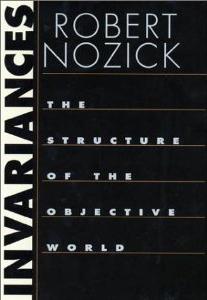Invariances

Cover of the first edition
|
|
| Author | Robert Nozick |
|---|---|
| Publisher | Belknap Press of Harvard University Press |
|
Publication date
|
2001 |
| Pages | 416 |
| ISBN | |
Invariances is a 2001 book by Robert Nozick, his last book before his death in 2002.
In the introduction, Nozick assumes "orthodox quantum mechanics" and draws inferences from it about indeterminism and nonlocality. He deprecates Bohm's formulation and ignores other no-collapse theories.
The book is divided into sections, each comprising several chapters, bearing the following titles.
Nozick holds that relativism about truth is a coherent position, and he explores the possibility that it is true. A set of truths T contains relative truths if the members of T are true and there is a factor F which can vary such that the truth value of the members of T varies. The truth or falsity of the members of T is a function of F (as well as of meaning, reference, and the way the world is). For instance, variation in gender (F) might affect the truth value of statements (T) not "explicitly about" gender.
Nozick argues that the timelessness of truth is a contentful empirical claim that might turn out to be false. A deflationary tack towards putative philosophical necessities such as this timelessness of truth, attempting to convert them into empirical issues, is a salient feature of the book. He takes the topic of truth to be the topic of what "determinately holds" ("A timeless truth that floats free of determinateness is a nonscience fiction") and appeals to quantum mechanics to show that there are problems about timeless truth as understood through determinateness. For instance, he claims QM "on the usual interpretation" undermines the idea that an event E's being determinate at an earlier time implies that it's determinate at all later times that E occurred at the earlier time. Truth is relative to space and time. He dubs his view "the Copenhagen Interpretation of Truth".
Nozick identifies three strands to the notion of an objective fact/truth.
More fundamental than these three is invariance: An objective fact is invariant under various transformations. For instance, space-time is a significant objective fact because an interval involving both temporal and spatial separation is invariant, whereas no simpler interval involving only temporal or only spatial separation is invariant under Lorentz transformations.
Nozick is skeptical about the extent and status of necessary truth. He maintains that there are no interesting metaphysical necessities, and even logical and mathematical truths are not ontological necessities. The apparent necessity of various statements is a product of various modes of representation.
...
Wikipedia
